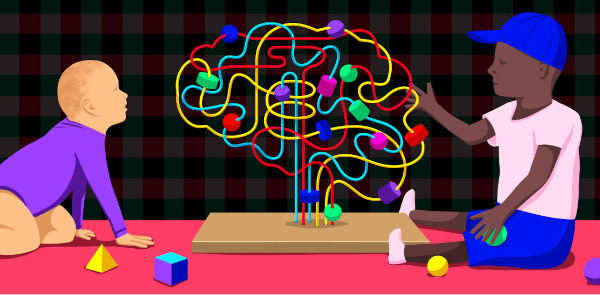Autism spectrum disorder (ASD) is a complex developmental condition involving persistent challenges with social communication, restricted interests, and repetitive behavior. While autism is considered a lifelong disorder, the degree of impairment in functioning because of these challenges varies between individuals with autism.
Diagnosis of Autism Spectrum Disorders
Early signs of this disorder can be noticed by parents/caregivers or pediatricians before a child reaches one year of age. However, symptoms typically become more consistently visible by the time a child is 2 or 3 years old. In some cases, the functional impairment related to autism may be mild and not apparent until the child starts school, after which their deficits may be pronounced when amongst their peers.
Social communication deficits may include(1):
- Decreased sharing of interests with others
- Difficulty appreciating their own & others’ emotions
- Aversion to maintaining eye contact
- Lack of proficiency with use of non-verbal gestures
- Stilted or scripted speech
- Interpreting abstract ideas literally
- Difficulty making friends or keeping them
Restricted interests and repetitive behaviors may include(1):
- Inflexibility of behavior, extreme difficulty coping with change
- Being overly focused on niche subjects to the exclusion of others
- Expecting others to be equally interested in those subjects
- Difficulty tolerating changes in routine and new experiences
- Sensory hypersensitivity, e.g., aversion to loud noises
- Stereotypical movements such as hand flapping, rocking, spinning
- Arranging things, often toys, in a very particular manner
Parent/caregiver/teacher concerns about the child’s behavior should lead to a specialized evaluation by a developmental pediatrician, pediatric psychologist, child neurologist and/or a child & adolescent psychiatrist. This evaluation involves interviewing the parent/caregiver, observing, and interacting with the child in a structured manner, and sometimes conducting additional tests to rule out other disorders. In some ambiguous cases, the diagnosis of autism may be deferred, but otherwise an early diagnosis can greatly improve a child’s functioning by providing the family early access to supportive resources in the community.
The first step is seeking an evaluation. Most parents start with their pediatrician who is checking on developmental milestones. If your child is under the age of 3 years, you can obtain an evaluation through your local early intervention system. If your child is over the age of 3, you can get an evaluation through your local school (even if your child does not go there). Contact your local school’s preschool special education team to request an evaluation. )
Risk Factors
The current science suggests that several genetic factors may increase the risk of autism in a complex manner. Having certain specific genetic conditions such as Fragile X Syndrome and Tuberous Sclerosis has been identified as conferring a particularly increased risk for being diagnosed with autism. Certain medications, such as valproic acid and thalidomide, when taken during pregnancy, have been linked with a higher risk of autism as well.(2) Having a sibling with autism also increases the likelihood of a child being diagnosed with autism. Parents being older at the time of pregnancy is additionally linked with greater risk of autism. Vaccines on the other hand have not been shown to increase the likelihood of an autism diagnosis, and race, ethnicity or socioeconomic status does not seem to have a link either. Male children tend to be diagnosed with autism more often than those assigned female sex at birth, albeit this ratio is changing over time.
Treatment
While there is no “cure” for autism, there are several effective interventions that can improve a child’s functioning:
Applied behavioral analysis: It involves systematic study of the child’s functional challenges, which is used to create a structured behavioral plan for improving their adaptive skills and decreasing inappropriate behavior
- Social skills training: Done in group or individual settings, this intervention helps children with autism improve their ability to navigate social situations
- Speech & language therapy: It can improve the child’s speech patterns and understanding of language
- Occupational therapy: This address adaptive skills deficits with activities of daily living, as well as problems with handwriting
- Parent management training: Parents learn effective ways of responding to problematic behavior and encouraging appropriate behavior in their child. Parent support groups help parents cope with the stressors of raising a child with autism
- Special education services: Under an Individual Education Plan provided by their school, which accommodates for their social communication deficits, restricted interests, and repetitive behaviors, children with autism can achieve their fullest potential academically. This includes special day classes for very young children to address language, social, and life skills.
- Treating co-occurring conditions: Children with autism experience insomnia, anxiety, and depression more often than peers without autism. They also more often have ADHD. Children with autism may have intellectual disability and this needs to be addressed. The impact of these conditions can be reduced with the proper services, which include all of the above, in addition psychotherapy and/or medication treatment
- Medication: A child psychiatrist can evaluate for co-morbid depression, anxiety, and impulsivity. If appropriate medications can be helpful. For example, autism-related irritability can be reduced by medications such as aripiprazole and risperidone (the two medications approved by the Food and Drug Administration for irritability associated with autism), prescribed judiciously by a knowledgeable clinician in collaboration with the child’s parents.
Several complementary and alternative interventions involving special diets and supplements have been tried over the years by parents/caregivers seeking ways to help their child with autism function better. To date compelling evidence has not been found to clearly recommend any such specific interventions. Research into these types of interventions continues, and parents/caregivers interested in them should discuss them with their child’s treating clinician.
Additional information can be found in the Expert Q&A and Resources sections.
Tips For Parents
- Learn as much as possible about autism spectrum disorder
- Provide consistent structure and routine
- Connect with other parents of children with autism
- Seek professional help for specific concerns
- Take time for yourself and other family members
Having a child with autism affects the whole family. It can be stressful, time-consuming and expensive. Paying attention to the physical and emotional health of the whole family is important. Many national and local advocacy organizations provide information, resources and support to individuals with autism spectrum disorder and their families. A few are listed in the Resources section.

